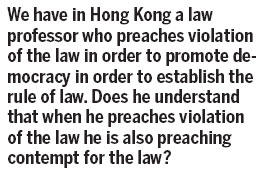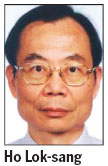Professor Tai's warped logic
Updated: 2013-06-04 07:12
By Ho Lok-sang(HK Edition)
|
|||||||

Professor Benny Tai Yiu-ting is right in saying that democracy is grounded on the principles of equal political rights and limiting the powers of public officials. But he is wrong in saying that democracy is the foundation of the rule of law. He recently wrote: "Clean government is the pillar of the rule of law; democracy is the foundation of the rule of law." (Mingpao, May 4) I would argue that the rule of law is the foundation of democracy and clean government. To establish true democracy, it is of utmost importance first to establish the rule of law. To uphold the rule of law, moreover, it takes both "soft" and "hard" institutions. Soft institutions refer to culture and values that are favorable to the rule of law. Hard institutions refer to standards and procedures that have been established over the years that ensure accountability and transparency. Generally, hard institutions include judiciary independence or the condition that no officials can control the judiciary to their personal advantage or that of the government.

Apart from hard institutions, there has to be a culture of deep respect for the rule of law that has to be considered as a "core value" by the community. Violating the rule of law in order to promote democracy is thus strange and appears to be a contradiction in terms.
In the aforementioned article, Tai referred to the introduction of the Independent Commission Against Corruption (ICAC) as a milestone in the history of Hong Kong's rule of law. He is totally correct. But the ICAC does not emerge from thin air. The ICAC was formed by statute, and was given special powers to investigate and to press charges against violators of the laws against corrupt practices. Thus, it is clear to me that the rule of law comes before the fight against corruption. Fighting against corruption cannot, therefore, be more fundamental than the rule of law.
Tai says that once the institutions of clean government have taken root in Hong Kong, a new culture that values clean government and the rule of law began to take root. Here he is partly correct. Certainly the ICAC helps nurture and promote a culture of clean government, but the ICAC could not have functioned without citizens' support. The fact that many citizens were ready to support the ICAC at the time means that deep in the hearts of citizens, there already is a commonly shared aspiration for clean government and belief in the rule of law. The rule of law cannot operate without citizens' respect for the rule of law.
Herein resides a profound puzzle. We have in Hong Kong a law professor who preaches violation of the law in order to promote democracy in order to establish the rule of law. Does he understand that when he preaches violation of the law he is also preaching contempt for the law? When many citizens arbitrarily hold contempt for the rule of law how can the rule of law be upheld?
As much as I share Tai's wish to see equal political rights and limiting the powers of officials and thus checking against possible power abuses - in Hong Kong as on the mainland, I cannot endorse his "Occupy Central" movement. I will not question his love for Hong Kong, but the above analysis shows that his logic is warped. My worry is that many young people will look up to him and other leaders in the movement as heroes, and gradually develop a sense of contempt for the law. If that should happen, the damage to the rule of law is done immediately.
Exactly because I share Tai's wish to prevent against the abuse of power by public officials - which is the use of powers at the expense of the public, I cannot understand how Tai can justify abusing his personal powers and the powers of his "co-Central-occupiers" at the expense of the public. Isn't it true that we need to respect other citizens' rights for a peaceful life and for going about their day-to-day activities?
Hong Kong is a free and open society. There is really no need to occupy Central to make a point. If they respect other people's rights, they will also earn other people's respect, and most probably they will also win more support for their causes.
In closing, the central government openly admits that corruption is a big problem on the mainland and that it is committed to fighting corruption. Checking against power abuses and limiting the powers of officials will stay high on the agenda of the central government. But imagining that an end to the one-party rule would clean up corruption is plain naive. Years ago Chen Shui-bian of the Democratic Progressive Party in Taiwan won his first election fighting corruption. He ended up in prison convicted with corruption. Ma Ying-jeou of the Kuomintang is now losing much support because several of his key cabinet members were convicted of corrupt practices. Checks against power abuses, it should be clear, must be against persons, not parties. But relying on another political party to clean up corruption is a vain dream.
The author is a director of the Center for Public Policy Studies at Lingnan University.
(HK Edition 06/04/2013 page1)